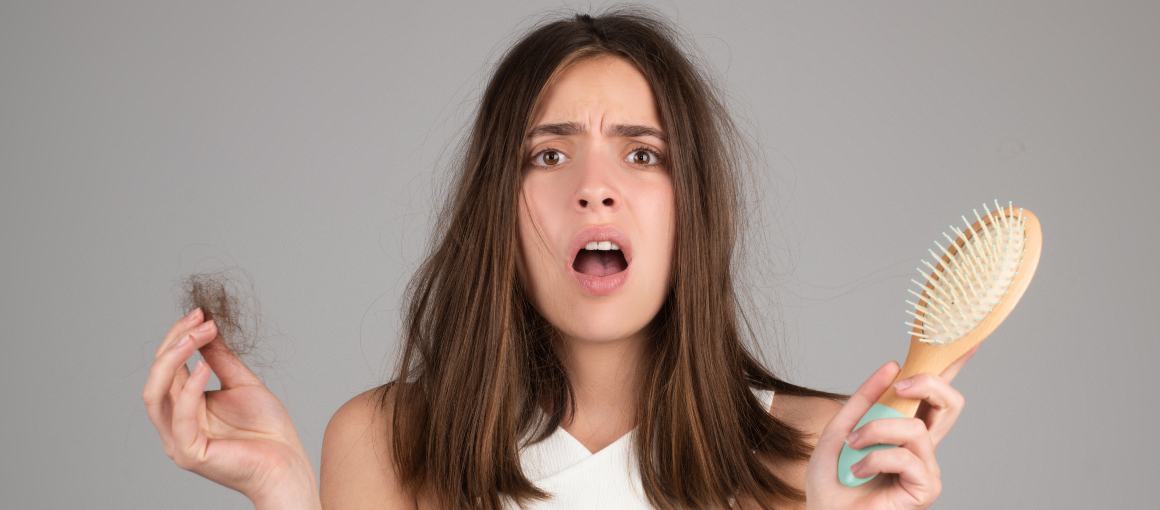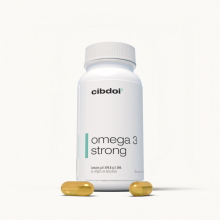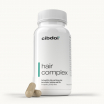Does Fish Oil Help With Dry Hair?
Last updated:
Published:
Dry, brittle hair that lacks shine and manageability is a common complaint. While there are many causes, some people wonder if taking supplements like fish oil can help nourish hair and prevent dryness.
Contents:
- Why Does Hair Become Dry and Damaged?
- What Nutrients Does Hair Need to Stay Healthy?
- How Might Omega-3s Improve Hair Moisture and Shine?
- What Do Studies Show About Fish Oil for Hair Health?
- How Much Fish Oil May Help With Dry Hair?
- Tips to Maximize the Benefits of Fish Oil for Hair
- Are There Any Precautions With Taking Fish Oil Supplements?
- Additional Tips for Dealing With Dry Hair
- Conclusion – Can Fish Oil Improve Dry, Brittle Hair?
This article will dive into the evidence on fish oil for improving hair hydration and look at the possible mechanisms. We’ll cover:
- Why hair becomes dry and damaged
- The nutrients hair needs to stay healthy
- How omega-3s may improve hair health
- What studies show about fish oil and hair
- How much fish oil may help hair
- Tips for maximizing the benefits for hair
- Any precautions needed with fish oil
- Additional ways to improve dry hair
By the end, you’ll know whether fish oil lives up to its reputation for boosting hair shine and moisture levels.

Why Does Hair Become Dry and Damaged?
Hair is made of a protein called keratin that contains sulfur bonds for structure and strength. Adequate moisture, oils and nutrients are needed to keep keratin supple and prevent hair shafts from drying out.
Several factors can cause water loss and damage that lead to dry, brittle hair:
1. Low Oil Production
Sebaceous glands at the base of hair follicles secrete oils like sebum to lubricate and protect hair. Low sebum production from aging, genetics, or medical conditions results in dryness.
2. UV Damage
UV rays from the sun degrade lipids in the hair shaft. This causes dull, dry, frizzy hair prone to breakage.
3. Heat Styling
Frequent use of hot styling tools like blow dryers and straighteners dehydrates hair over time.
4. Chemical Processing
Chemicals in dyes, perms and bleaches strip the protective cuticle layer off hair, causing moisture loss.
5. Hard Water
Mineral deposits from hard water stick to hair strands, leaving buildup that clogs follicles and prevents moisture retention.
6. Shampooing Too Often
Frequent shampooing, especially with harsh formulas, can wash away the oils that keep hair supple and hydrated.
7. Nutrient Deficiencies
Being deficient in nutrients like omega-3s, zinc, biotin, or vitamin E can negatively impact hair health and cause brittleness.
What Nutrients Does Hair Need to Stay Healthy?
The primary nutrients linked to optimal hair health include:
Protein
Consuming adequate protein provides amino acids like cysteine and methionine to produce keratin and collagen in hair. Deficiency causes hair loss and dry, fragile strands.
Iron
Iron enables oxygen delivery for hair growth and repair. Low levels lead to decreased sheen and vitality.
Zinc
Zinc is crucial for DNA and protein synthesis in hair follicles. Deficiency can trigger hair loss and dandruff.
Biotin
Biotin aids keratin infrastructure development in hair. Inadequate biotin intake is associated with brittle, thinning hair.
Vitamin C
Vitamin C boosts iron absorption and collagen production for healthy hair follicles andminimized breakage.
Vitamin E
Vitamin E functions as an antioxidant in scalp and follicles, preventing UV and free radical damage to hair.
Omega-3 Fatty Acids
Omega-3s moisturize hair by regulating sebum production and inflammation. They help create a hydrated, glossy look.
While many nutrients support hair health, omega-3s specifically help nourish hair and prevent dryness. Let’s look closer at the evidence.
How Might Omega-3s Improve Hair Moisture and Shine?
Omega-3s affect hair in a few ways that may reduce dryness and brittleness:
1. Regulate Sebum Oil Production
Omega-3s help set just the right level of sebum oil output by follicles – not too little causing dryness, not too much causing greasiness.
One study in women found omega-3 supplements decreased self-reported oiliness and objective skin oil levels.
2. Lower Inflammation
Chronic inflammation can damage hair follicles. The anti-inflammatory properties of omega-3s reduce scalp inflammation to support follicle and hair health.
3. Prevent Hormonal Imbalances
Hormone fluctuations can disrupt oil secretion. By regulating reproductive hormones, omega-3 intake may prevent excess sebum production and dryness.
4. Improve Scalp Circulation
Better blood flow provides more nutrients to follicles and enhances gas exchange critical for hair growth. Omega-3s optimize circulation.
5. Strengthen Cell Membranes
Omega-3s EPA and DHA get incorporated into the membranes of skin and follicle cells, helping maintain structural integrity and moisture capacity.
Through these mechanisms, getting more omega-3s may help optimize moisture and oil balance in hair. But what does the clinical evidence show?
What Do Studies Show About Fish Oil for Hair Health?
Relatively few studies have directly examined the effects of fish oil supplements on hair. However, some small trials show promising results:
- Women taking omega-3 supplements for hair loss experienced reduced hair shedding and improved hair strength and shine.
- In patients with alopecia areata, fish oil decreased hair loss and increased hair density compared to placebo after 6 months. Nearly half regrew 50% of hair versus none in placebo.
- Among adolescents with hair loss, those who took fish oil supplements had significantly increased hair density after 6 months compared to placebo.
- Fish oil supplements improved hair growth in rats by stimulating hair follicle cell proliferation. The omega-3s were incorporated into the cell membranes.
While more research is still needed, these studies provide preliminary evidence that omega-3 intake may improve hydration, gloss and thickness of hair.
How Much Fish Oil May Help With Dry Hair?
There aren’t specific dosing guidelines for using fish oil supplements to remedy dry hair. However, the studies above and skin health research provide reasonable target intakes:
- General Health: 250–500 mg combined EPA/DHA daily
- Dryness Prevention: 1,000 mg EPA/DHA daily
- Treating Hair Loss: 2,000–4,000 mg EPA/DHA daily
Spread doses throughout the day with food or snacks to enhance absorption and prevent fishy burps.
Look for a quality fish oil providing at least 500 mg total omega-3s per 1,000 mg capsule. Liquid fish oil concentrates can provide higher doses in a smaller volume.
Be patient. It can take 3–6 months to notice a difference since hair only grows about 1⁄2 inch per month. Maintaining long-term daily intake is key for benefits.
Tips to Maximize the Benefits of Fish Oil for Hair
Here are some simple tips to get the most out of fish oil supplements for boosting hair health:
- Choose high-quality fish oil supplements with EPA/DHA purity testing to ensure freshness. Look for added vitamin E.
- Apply fish oil directly to your scalp and massage in. This provides concentrated benefits to hair follicles.
- Take antioxidants like astaxanthin and vitamin C which prevent omega-3s from oxidizing before absorption.
- Focus on getting 2,000–4,000 mg total EPA/DHA daily for noticeable improvements in hair dryness, thickness and growth.
- Drink plenty of water and use a moisturizing shampoo and conditioner to boost hydration.
- Limit heat styling, chemical treatments, swimming in chlorine, and other sources of damage while taking fish oil.
- Have realistic expectations. Fish oil strengthens hair but may not completely reverse dryness or drastic thinning.
Consistency is key. Stick with a therapeutic fish oil dose for at least 6 months for the best chance of seeing benefits for dry, brittle hair.
Are There Any Precautions With Taking Fish Oil Supplements?
Fish oil is generally well tolerated and safe when taken as recommended. But there are a few potential side effects to keep in mind:
- Fishy aftertaste – Taking with juice or coffee can help mask the taste. Freezing capsules reduces fishy burps.
- Digestive upset – Start with a low dose taken with food and slowly increase over 2-4 weeks to minimize GI issues.
- Interactions – High doses may thin the blood. Discuss with your doctor if taking blood thinners.
- Contaminants – Choose reputable brands that purify oils and test for PCBs, heavy metals and toxins.
- Allergies – Those with fish or shellfish allergy should opt for plant-based omega-3s like algal oil.
Always read labels carefully and consult your healthcare provider before starting fish oil, especially at higher doses above 2 grams per day. While generally safe, check for potential interaction with any medications or health conditions.
Additional Tips for Dealing With Dry Hair
While fish oil supplements show promise for improving hair dryness, texture and shine, they work best paired with other strategies:
- Limit shampooing to 2-3 times per week and use a gentle, hydrating shampoo and conditioner.
- Reduce heat styling and opt for gentle, natural drying techniques when possible.
- Apply nourishing masks or oils like olive, coconut, argan or almond oil to boost moisture 1-2 times per week.
- Load up on foods rich in hair-healthy nutrients like avocados, nuts, seeds, eggs, spinach and antioxidant fruits. Stay hydrated.
- Address any scalp issues like dandruff, excess oil production or inflammation that can contribute to dehydration.
- Consider a biotin, collagen or keratin supplement for additional structural nutrition.
- Be patient and consistent. Improving hair health happens slowly over months. Stick with a regimen.
While more research is warranted, fish oil is a safe option that may enhance gloss and moisture balance when paired with other hydrating hair care practices. Focus on long-term habits for addressing the root causes of dry, damaged hair.
Conclusion – Can Fish Oil Improve Dry, Brittle Hair?
In summary, fish oil shows potential for combating chronically dry, damaged hair based on its mechanisms and some preliminary research:
- The omega-3s EPA and DHA help regulate optimal sebum oil production to prevent dehydration and greasiness.
- Omega-3s lower inflammation that can impair hair growth and cause dandruff or folliculitis.
- Omega-3s nourish hair cell membranes for enhanced moisture retention.
Small studies report fish oil supplements increase hair shine, strength and density – although research is still limited. Aim for at least 2,000 mg EPA/DHA daily for noticeable improvements in dryness.
Fish oil is very safe for most people and provides additional health benefits beyond hair moisture. But combining fish oil with a holistic approach is best for nourishing hair from the inside out and repairing dryness long-term. Be patient when using supplements like fish oil for hair health.
















